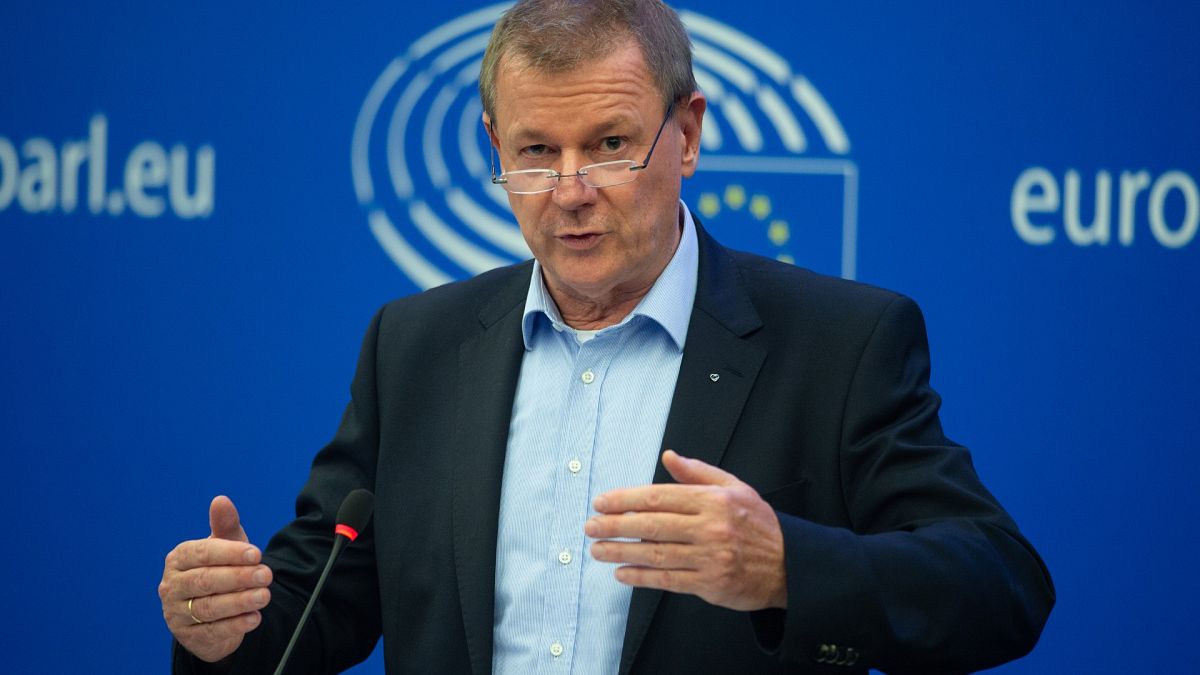Lawmakers called 382-144 to reverse the decision to appoint Markus Pieper in a suspected case of political favouritism.
Lawmakers at the European Parliament today (11 April) called to rescind the appointment of Markus Pieper as European Commission small business envoy, in a vote that passed 382 votes to 144.
The hiring has led to political cronyism allegations against Commission President Ursula von der Leyen – but it’s not clear how much influence the lawmakers’ vote will have over a decision taken by a separate EU institution.
The amendment proposed by MEPs from the Green, Socialists and Democrats, and centrist Renew groups - first reported exclusively by Euronews last week - “questions whether the principles of merit, gender and geographical balance were taken into consideration” when selecting Pieper.
One of those MEPs, Daniel Freund (Germany/Greens), on Wednesday told lawmakers Pieper got the lucrative four-year posting because he’s in the same German political party as von der Leyen, Germany’s Christian Democrat Union.
The episode is “sad and shameful”, Freund said, adding: “I don’t know how we can explain it to voters.”
The European Parliament plenary session has now formally agreed with Freund, and said the EU executive should re-launch the process to fill the post, which carries a €20,000-a-month salary, in a “truly transparent and open way”.
A parallel amendment from Pieper’s allies said that the process had been “formal, fair and multi-step" and that “assessment procedures ... should not be used for party or personal campaigning goals.”
That amendment, from Ivan Štefanec (Slovakia/EPP), was not selected.
Addressing reporters immediately after the vote, European Commission Chief Spokesperson Eric Mamer said “the European Parliament is certainly within its role to vote the amendments it wishes”, but added that the Commission has “institutional independence” in recruitment matters.
The Commission will respond to detailed points raised in the Parliament’s resolution in due course in line with normal procedures, Mamer added, confirming that Pieper will start duties next week.
The decision took place as part of MEPs’ decision to sign off the EU budget, after a wide-ranging debate that ranged from Russian interference to recognition of the state of Palestine.
The lawmakers’ move follows days of uproar over the nomination – including from some of von der Leyen’s own senior lieutenants.
At a regular weekly meeting of Commissioners on Wednesday, France’s Thierry Breton and Spain’s Josep Borrell complained of a lack of transparency and collective decision-making at the top of the EU executive, a source briefed on the discussion told Euronews.
But that debate doesn’t seem to have changed the outcome, as Slovakian Commissioner Maroš Šefčovič emerged from the meeting to tell reporters that rules and procedures had been followed in the Pieper case.
Though the amendment passed, it’s not clear what influence it will have on the Commission. Pieper has already signed a contract to start work on the job as of next Tuesday, 16 April.
Despite Šefčovič’s assurances, significant questions still remain over the appointment, formally made on 31 January.
According to media reports, repeated by Freund, Pieper was outperformed during the formal recruitment by multiple other candidates. At least one of them – Czech MEP Martina Dlabajová – has lodged a complaint with the Commission’s Human Resource service.
A Commission spokesperson has said that performing well in early stages of testing doesn’t guarantee the job – but there are also plenty of concerns over later stages of the procedure, which included an interview with Bjoern Seibert, von der Leyen’s chief of staff.
Published EU guidance says senior appointments should be made in agreement with portfolio commissioners – though established practice from the last ten years has merely required consultation of the relevant Commissioner, a Commission spokesperson told Euronews.
In this case, Breton, responsible for EU small-business policy, does not appear to be on board.
During years of experience working with senior appointments at the Commission, “there was never a single case” of naming someone without consent of the relevant portfolio Commissioner, one senior EU official, speaking on condition of anonymity, told Euronews.
A Commission spokesperson has told Euronews the decision to hold an interview with Seibert was in accordance with an internal decision of September 2020, but that has also raised eyebrows given Seibert has since become the head of von der Leyen’s political campaign team at the EPP.
“In my own experience I’ve never seen that [a president's head of cabinet conducting such an interview] happen,” the anonymous official said, adding it constituted an "inherent conflict of interest” given Seibert’s subsequent move.
UPDATE (11 April, 12:33): Adds comments from Mamer.
